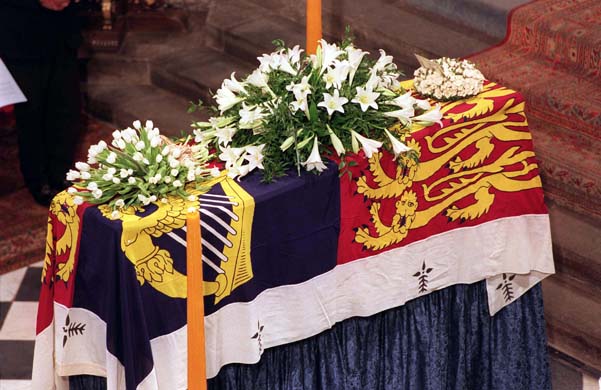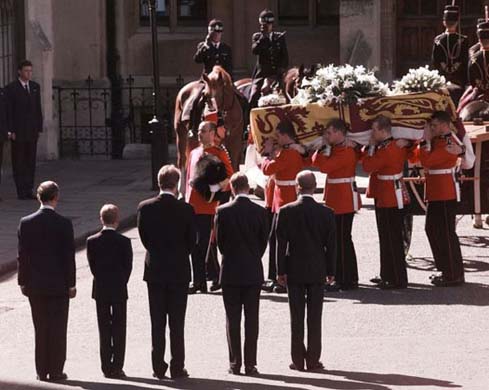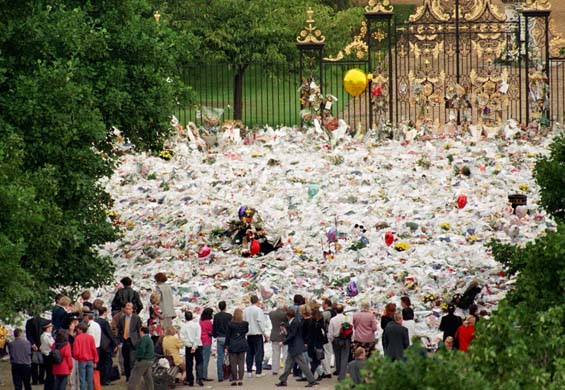
My household is rarely silent. But as my horror-stricken family watched the televised footage of Princess Diana’s funeral on September 6, 1997, there were no words left to be said. Though I was only five years old at the time, memories of that somber day and all the various events and media coverage leading up to it will always be seared into my brain. Being so young, I was completely unfamiliar with the concept of death, let alone funerals and eulogies. Sinking in the corner of my living room sofa, I remember trying to grasp some sort of understanding for the terrible tragedy unfolding before me on my television screen.
It was strange to me that things that seemed so familiar to me had begun taking on a new meaning. Welsh Guards, whom I had only seen in my cartoons and sitcoms treated as slapstick fodder, were suddenly transformed into solemn soldiers showing the ultimate display of patriotism by carrying the coffin holding their nation’s beloved princess. “Candle In The Wind”, an extremely overplayed song in my car, lost its mundane and annoying qualities and suddenly became a touching tribute to someone who clearly lived a life that was misunderstood by many. Thinking back now, it’s fascinating that media plays such a defining role in not only shaping our meaning of what we encounter in the world but changing our perceptions as well, on intrapersonal, interpersonal, and group levels.

However, I also remember the media coverage of Princess Diana’s death providing a negative influence as well. I was too young to completely understand it all but I remember the slew of tabloid headlines and jarring statements that started spreading following her death. Conspiracy theories and accusations of assassination plots were being discussed everywhere, it seemed, even among the more reputable news sources like CNN. Even amongst the all the devastation her death brought, media outlets was not only reporting it but utilizing and exploiting it for their own means.
Looking back now, I see Princess Diana’s death as a prime example of both the positive and negative aspects of being defined by a dominant culture and how the media facilitates such a process. Even though the media was responsible for bringing about many false claims about her personal life during a time that those closest to her would have wanted to mourn privately and peacefully, such intense celebrity scrutiny has become an inevitable part of mainstream culture. From another perspective, the endless attention given to her actions also raised awareness in a positive way—for instance the charities she was involved with were highlighted by the media because of their connection to her. No matter what scandalous claims were made following her death, it is clear that Princess Diana is still seen as an adored icon today, not only in the U.K but throughout the whole world, illustrating the unifying effect of media.

In a sense, I suppose it’s strange that my first experience with death was one that was simultaneously shared with 2.5 billion other people in the world. As discussed in Chapter 1 of “Mass Communication: Living in a Media World”, the power of media to rapidly spread information and news is vital in assuring that a certain event or person will leave a lasting cultural impact on our world. But inevitably, death, especially under such tragic circumstances, and the meaning we choose to take away from it, is something all humans must undergo. It is something that serves to stretch across and unite all cultures, to create and represent “our collective experience” as Baran remarks in “What Is Culture?”. Therefore, it is not surprising that such a shared emotional response is often perpetuated through the equally interactive mediums that mass media provides.
Photo Sources
I completely agree with you that coverage of Princess Diana's death showed both the negative and positive sides of the Media. I remember watching the news with my family. We were all so sad but the coverage allowed the world to grieve together. Without television we would have never been able to participate in her funeral and have the chance to honor her memory. But on the other side of that it seemed that the media also went too far and stripped her and her family of privacy. There was no balance and lines were crossed when this tragedy turned into tabloid fodder.
ReplyDeleteThis comment has been removed by the author.
ReplyDeleteThis is a great example of the effects of the media in our lives.The medium, in this case the television, is very important as it was showing the details of the funeral with sounds and images makes us feel like we were attending the event. Also because it was internationally broadcasted, this allowed millions of people who could not afford to be present at the funeral to watch it live and feel the same sentiment as those who were physically present there. Marshall McLuhan's statement "The medium is the message," is proven here. He meant that the procedure used to transmit a message is the key to the message.
ReplyDelete